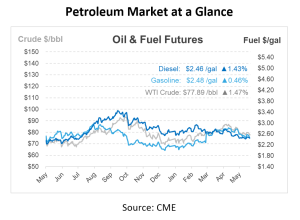
Storm-Ready – Emergency Plan for Uninterrupted Operations
As hurricane season approaches, concerns grow about the potential impact of these storms and their capacity to cause disruptions. For businesses, particularly those dependent on consistent fuel supplies, natural disasters can present significant operational challenges. The unpredictability of hurricanes, which can bring not only high winds and flooding but also power outages and severe supply chain disruptions, underscores the need for a comprehensive emergency response plan. Ensuring response plans are robust and well-practiced can help businesses maintain continuity, protect assets, and minimize downtime during such turbulent times.
When a hurricane hits, businesses can face numerous challenges, but one of the most critical is ensuring a steady supply of fuel. To illustrate the impact on businesses, consider an actual auto parts and repairs company in Florida. This company relies heavily on fuel to power its operations, including its delivery fleet. When Hurricane Ian struck in 2022, the company faced a daunting challenge, with widespread power outages and logistical disruptions. Retail fuel stations were either closed or overwhelmed by long lines, which could have severely affected the company’s ability to maintain operational continuity. However, they were prepared.
The Solution
Understanding how unpredictable storms could be and recognizing the essential nature of its services, the company secured a business continuity plan with Mansfield Energy ahead of that year’s hurricane season. When the storm struck, the fuel manager promptly contacted Mansfield to secure the fuel supply needed to resume operations. Mansfield provided a dedicated fuel truck with a driver tasked specifically with fueling their delivery fleet, store generators, and employee vehicles.
This emergency response plan enabled the company to quickly get its team up and running after the hurricane passed. By ensuring that logistical assets were fueled and ready, they could resume operations faster than might have otherwise been possible.
Lessons Learned and Best Practices
This case serves as a valuable lesson for other companies in similar situations. With that in mind, below is a list of some best practices for crafting an effective emergency response plan:
- Assess Vulnerabilities – Understand the specific risks associated with your business and operations during natural disasters. This involves analyzing how disruptions could potentially impact operations and what measures are necessary to mitigate these risks.
- Partner with Suppliers – Establish strong relationships with key suppliers, like fuel providers, before disaster strikes. Having a partnership based on the optimal balance of economic and operational efficiency ensures that you can rely on that mutual understanding during emergencies.
- Dedicated Resources – Consider the benefits of having dedicated resources such as fuel storage tanks or emergency generators that can be deployed quickly to critical areas of operation. This ensures that you are not left waiting only for external help to arrive.
- Regular Reviews and Drills – Review and update your emergency plan regularly and conduct drills to ensure that when the plan is needed, everyone knows their role and can act efficiently and effectively.
For businesses reliant on fuel and other critical supplies, having an emergency response plan in place is essential for operational continuity. As hurricane seasons become more unpredictable, the importance of preparedness cannot be overstated.
Not sure how to implement your Emergency Plan? Talk to the experts!
Mansfield Energy, North America’s leading fuel distributor, brings a wealth of expertise to the table in creating a robust emergency response program tailored to your company’s needs. With an extensive network servicing the US and Canada, Mansfield understands the critical importance of proactive measures in facing potential disruptions caused by hurricanes or other natural disasters.
Leveraging in-depth knowledge, Mansfield has developed a comprehensive Emergency Response Fuel Program that prescribes industry best practices. Mansfield’s program enables a multi-faceted approach, prioritizing essential services and collaborating closely with partners to ensure seamless fuel distribution during emergencies. Contact us today!

This article is part of Daily Market News & Insights
Tagged: emergency response, storm plan, Storm Season, storms
MARKET CONDITION REPORT - DISCLAIMER
The information contained herein is derived from sources believed to be reliable; however, this information is not guaranteed as to its accuracy or completeness. Furthermore, no responsibility is assumed for use of this material and no express or implied warranties or guarantees are made. This material and any view or comment expressed herein are provided for informational purposes only and should not be construed in any way as an inducement or recommendation to buy or sell products, commodity futures or options contracts.





